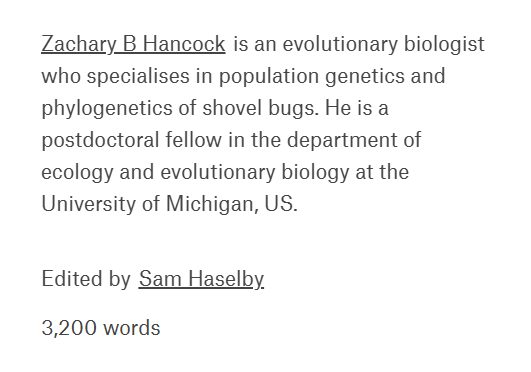Welcome to DU!
The truly grassroots left-of-center political community where regular people, not algorithms, drive the discussions and set the standards.
Join the community:
Create a free account
Support DU (and get rid of ads!):
Become a Star Member
Latest Breaking News
Editorials & Other Articles
General Discussion
The DU Lounge
All Forums
Issue Forums
Culture Forums
Alliance Forums
Region Forums
Support Forums
Help & Search
A resurrected defence of beanbag genetics

Beanbag genetics
Today a bitter dispute about the nature of biology is underway. A simple bag of beans may be what tips the balance
https://aeon.co/essays/a-resurrected-defence-of-beanbag-genetics

A peppered moth (Biston betularia). Photo by Ian Redding/Getty Images

Life is immensely complex. At every level, from molecules and cells to entire organisms and the intricate ecological balance between species, biologists are amazed by the staggering complexity and interconnectedness of life. Historically, biologists have approached the complexity of life in two ways. Peering into the tapestry of complexity, one way is to search for general threads of order that weave together seemingly disparate facts. For example, while life is incredibly diverse, all living things are well fit to their environment. Charles Darwin, the father of evolution, discovered that a single process explained how this happened – he called it natural selection. All species have variation in their traits – some have thicker fur or longer beaks – and if any of those differences help the organism survive and reproduce, it will pass on that trait to future generations.
Over time, this moulds organisms to become well adapted to their environment. In this view, evolutionary theory becomes a unifying idea in biology. All organisms, from microbes to jellyfish, ferns to elephants, are connected by the common thread of evolution. If there are truly universal laws governing how organisms evolve, then we should be able to represent these rules mathematically in the same way a physicist expresses universal concepts like the laws of motion. This approach has been taken by population genetics – since its beginnings in the 1910s, population geneticists have derived hundreds of mathematical equations to describe how evolution occurs under a myriad of conditions. Often, these equations are agnostic to whether the organism is a bird or a shrimp, they are concerned only with transmission rules (that is, how genes are passed on to the next generation), and the processes that bias those rules (ie, evolutionary forces).
The other way of approaching complexity is to look upon the tapestry and conclude that no general rule or law can unite these threads. Biology is not like physics – there are too many variables in the real world to represent life as a mathematical expression. A single concept like ‘natural selection acting on variation’ cannot possibly help us understand why some microorganisms, like Paramecium, have scrambled DNA that has to be rewired every time they need to build a new cellular feature. Or how genes get turned off or on by interacting with an intricate array of molecules that are themselves modulated by different environmental cues. To understand life is to study each molecule, cell, individual and species as a unique feature of the world. Evolution, in this view, becomes the study of a mountain of individual facts, each of which tell us something new about evolution as a process. Each new discovery is a paradigm shift, a cause to update the textbooks, and promotes the view that evolutionary theory is in a constant state of extension and revision.
While these two views of biology should be complementary, they have often been bitterly at odds. As the controversies oscillate in intensity, the past decade in biology has represented a heightened period of contention. Some have claimed that there is a ‘struggle for the soul of the discipline’ being played out – new discoveries in molecular, cellular and developmental biology are heralding a revolution in evolutionary thinking. Instead of a few fundamental principles, evolutionary biology, they contend, should be viewed through a pluralistic lens. We should scrap any attempt at finding analogues to the laws of motion for biology, and embrace the complexity – the only law in biology is that there are no laws in biology. These biologists and philosophers are united by little more than their scepticism of the first way of viewing life, and so have variously called for ‘extending’ evolutionary theory to downright replacing it with a new paradigm. Among the causes of evolution missing, according to this view, are concepts like niche construction, developmental bias, epigenetics, biological agency, etc. But to understand the current debate, it’s perhaps instructive to return to a previous peak in the wave function of biological disputes.
snip